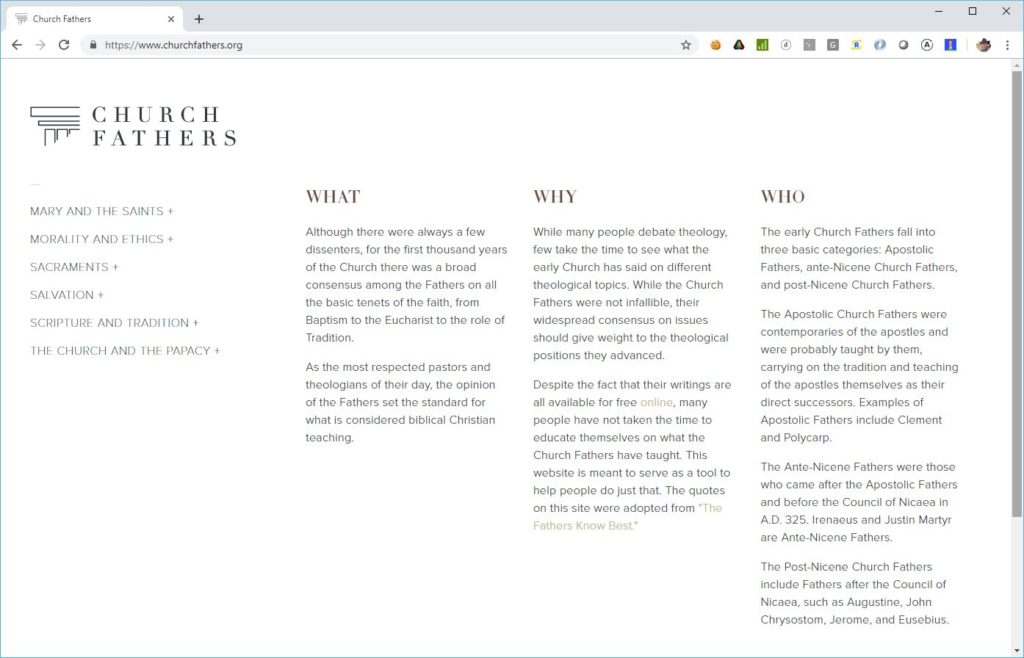Church Fathers Website Facelift
The Church Fathers website I advertised several years ago recently received something of a facelift:

"We are travellers…not yet in our native land" – St. Augustine
The Church Fathers website I advertised several years ago recently received something of a facelift:


A couple of days ago I posted some of the important dates concerning the setting of the Biblical canon. Closely related to the subject of the canon is the issue of the deuterocanon, the books referred to by Protestants as “the apocrypha”, which were removed from the canon at the time of the Reformation.
I haven’t done a “Quick Apology” post this week, so here goes. However, rather than dealing with just one objection in this post, today I’m going to provide a series of brief rebuttals of the top ten most common objections raised….
Protestants typically say that the deuterocanonical books shouldn’t be included in the Bible because…
 As you’ll see from the categorization of this entry, this is an apologetics post. In this article I am going to be defending the use of the writings of the Early Church Fathers in demonstrating the historicity and veracity of the Catholic Faith.
As you’ll see from the categorization of this entry, this is an apologetics post. In this article I am going to be defending the use of the writings of the Early Church Fathers in demonstrating the historicity and veracity of the Catholic Faith.
The problem with writing a defence of anything is that, even with the best will in the world, it’s still easy to come across as though you’re attacking those to whom you are responding.
So, if you’re reading this post and you feel that it comes across as Protestant-bashing then I’m truly sorry. This is certainly not my intention. In fact, this was one of the reasons why I penned the Ecumenical Apologist entry, to try and dispel such charges. In this post I simply want to present something of an explanation as to why one should care about the Early Church Fathers.
On the occasions when I’ve been engaged in apologetics with non-Catholic Christians I’ve often mentioned the Early Fathers. I’m usually met with blank stares. The Early who?! Unfortunately, like Catholics, our separated brethren haven’t read much of the Early Church Fathers either
One of my hopes for this blog is that it will encourage both groups to read the Fathers and learn more about our common heritage. The Early Church Fathers are fundamentally important in ecumenical work since they were living in a time prior to the divisions of the Great East/West Schism and the Reformation.
On the odd occasion when I do encounter non-Catholics who have heard of the Fathers, they usually only have second-hand information and have actually not read any of their writings. This is not true of all non-Catholics, of course, but in my limited experience it has at least been the larger majority. It should come as no surprise then, upon meeting Catholic or Protestant Christians unfamiliar with the Fathers, I immediately encourage them to begin by reading the letters of my favourite Early Church Father, St. Ignatius of Antioch
Yesterday, Joe over at Shameless Popery wrote a great post entitled Three Ways You Shouldn’t Treat The Church Fathers. Here were his three points:
Wrong Way #1: Ignoring or Fearing the Church Fathers
Reason: It Reduces Christianity to Incoherence
Wrong Way #2: Exploiting the Church Fathers
Reason: It Doesn’t Treat the Fathers Honestly
Wrong Way #3: Treating the Church Fathers as Infallible
Reason: The Fathers Occasionally Disagree
In this blog post I would like to talk a little bit about the third item. In apologetic exchanges I have often had to correct the non-Catholic assertion that we regard the Fathers as infallible. We don’t. As Joe points out, the Fathers occasionally disagree. It is on this point that I sometimes hear another objection. Here is what someone recently wrote to me:
“The fathers didn’t agree on every matter of doctrine so their opinion is no more reliable than anyone else’s. There were some heated arguments between some of them. In what way are they different from two modern-day non-Catholic pastors disagreeing over a certain interpretation of the Bible?“
I would like to take the rest of this blog entry to address this objection.
 The Second Reading at Mass today is one of those better known Scripture passages, St. Paul’s praise of the virtue of love, found in his First Letter to the Corinthians.
The Second Reading at Mass today is one of those better known Scripture passages, St. Paul’s praise of the virtue of love, found in his First Letter to the Corinthians.
“Love is patient, love is kind. It does not envy, it does not boast, …“. I’m pretty sure I don’t need to quote the rest of this passage as you will have certainly heard it at…every…single…wedding…you have ever attended
It is my guess that St. Paul’s great hymn of love was the inspiration for a section of an epistle written by St. Clement of Rome at the end of the First Century. A few decades after St. Paul’s death, St. Clement wrote a letter to that same troublesome Corinthian congregation to address that community’s latest round of problems. Some young whipper-snappers had usurped control of the church and deposed their clergy. The Bishop of Rome wrote to them, urging the members of the church to obedience and to brotherly love.
I was wondering if anyone who reads this blog knows of a good internet forum for discussing the works of the Early Church Fathers. I have been looking for a little while and haven’t had much success. I’ve been petitioning Catholic Answers to add a “Patristics” section to their forum, but so far I haven’t had much luck…
The best one I’ve found to date has been the Orthodox site Monachos.net:
So…any others?
Today is the Feast Day of probably my favourite Early Church Father, St. Ignatius of Antioch:
Today in the Office of Readings we read a section of one of the letters he wrote on his way to martyrdom sometime around AD 107:
“I am writing to all the churches to let it be known that I will gladly die for God if only you do not stand in my way. I plead with you: show me no untimely kindness. Let me be food for the wild beasts, for they are my way to God. I am God’s wheat and shall be ground by their teeth so that I may become Christ’s pure bread. Pray to Christ for me that the animals will be the means of making me a sacrificial victim for God.
“No earthly pleasures, no kingdoms of this world can benefit me in any way. I prefer death in Christ Jesus to power over the farthest limits of the earth. He who died in place of us is the one object of my quest. He who rose for our sakes is my one desire. The time for my birth is close at hand. Forgive me, my brothers. Do not stand in the way of my birth to real life; do not wish me stillborn. My desire is to belong to God. Do not, then, hand me back to the world. Do not try to tempt me with material things. Let me attain pure light. Only on my arrival there can I be fully a human being. Give me the privilege of imitating the passion of my God. If you have him in your heart, you will understand what I wish. You will sympathize with me because you will know what urges me on.”
– Ignatius of Antioch, Letter to the Romans
Here is a diagram showing the relationships between Jesus, His Apostles, Ignatius of Antioch and some of the other Early Church Fathers:
If you would like to read more of St. Ignatius’ writings, or listen to them free on MP3, be sure to check out the Church History section of this blog.